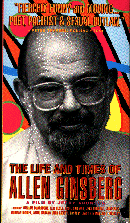 Produced
and directed by: Jerry Aronson
Produced
and directed by: Jerry AronsonCost: $29.95
Distributer contact: First Run Features 1-800-488-6652
Running time: 82 minutes
Media format: VHS videocassette, color
 Produced
and directed by: Jerry Aronson
Produced
and directed by: Jerry Aronson
Cost: $29.95
Distributer contact: First Run Features 1-800-488-6652
Running time: 82 minutes
Media format: VHS videocassette, color
Only a few days had gone by after Allen Ginsberg's death, when Jerry invited me to review a documentry film he had produced called The Life and Times of Allen Ginsberg. I had previously seen the Kerouac documentry and another one on William Burroughs, so now was a chance to see one on Ginsberg. Naturally, I jumped at the chance. The video arrived a couple of days later.
The first thing I have to say about the film is it is not another static documentary. It shows Allen Ginsberg in action from start to end. It wasn't thrown together in a hurry either. It took a decade of going through the archives to put this film together. The result is a comperhensive documentary from Ginsberg's youth to a few years before his death.
The documentry is divided by each decade of Ginsberg's life, the 60's segment being the longest, since there was never a dull moment during that decade of Ginsberg's life. The other segments tell the rest of the story. The first part of the film reveals Ginsberg's troubled youth and the hardships of having to grow up with a mentally ill mother. Included in this section are some home movie clips of Ginsberg playing on the beach and interviews with his stepmother and aunt.
The next section is about the 40's, when Ginsberg meets the other Beats. After that, comes the section on the 50's and presents Ginsberg reading Howl and Kaddish, the poem about his mother's death. This section also discusses Allen meeting Peter Orlovsky, and finding love at last.
The section about the 60's had a lot of ground to cover. It starts out with Ginsberg contacting Timothy Leary about the Harvard psilocybin project. Ginsberg ended up taking part in this project, as did many of the other Beats, including Kerouac and Cassady. Next, there's Ginsberg testifying before congress about LSD. There is some footage that looks like it might have been from the be-in that Ginsberg was involved in, but it's hard to tell because the voice-over at the time was on some other subject. The section continues with Ginsberg getting expelled from Prague for being too popular with the people, his efforts to keep the peace at the Democratic Convention in Chicago and it ends with Kerouac's funeral.
The 70's segment was mainly about Ginsberg's work at Naropa and the "stop the train" demostration, and also about his dad's death. In the final segment, Ginsberg shows off his family album of photos. Throughout the documentry, there are remarks by Ken Kesey, Joan Biaz, Timothy Leary and other people who knew Ginsberg, plus there are segments of Ginsberg's appearances on Dick Cavitt and on William Buckley's show.
Some of the things that make this documentary work are it's about the right length (any longer and it would overwhelm you with too many details to remember, any shorter and it would have left something important out) and it contains about the right balance of humor and sadness. It really does a good job showing Ginsberg being Ginsberg, capturing him where the action is. This video is a must have for Ginsberg fans, plus anyone involved with the counterculture will definitely want a copy for their archives. Now that Allen is no longer among us, The Life and Times of Allen Ginsberg is probably the best way to experience his spirit.
Copyright © 1997, Colin Pringle
ltoag.htm